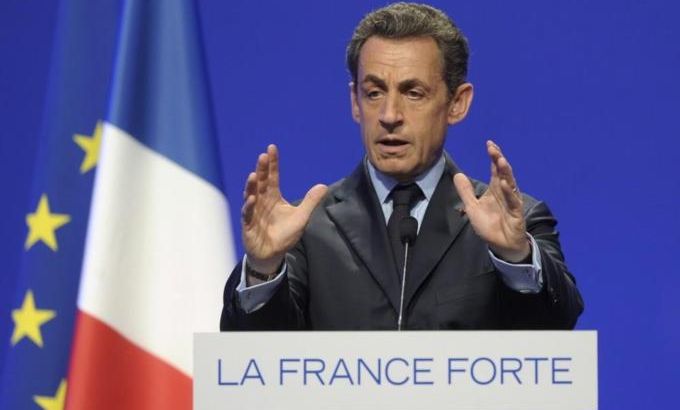Profile: Nicolas Sarkozy
Despite low approval ratings during his first term, ‘President Bling-Bling’ is not yet out of the race.

More than five years ago, President Nicolas Sarkozy waged a successful presidential campaign by promising France a “rupture with a certain style of politics”.
Despite being narrowly beaten by challenger Francois Hollande in the first round of the elections, Sarkozy’s current re-election campaign still promises the same “rupture” – although this time, the incumbent has changed his tune.
Campaigning under the slogan “a stronger France”, Sarkozy has declared himself “the captain of a ship caught in a storm” who will restore France to economic prosperity.
He vows, if re-elected, to continue his battle against the traditional French 35-work week by loosening labour laws, and taxing French corporations that operate outside the country’s borders.
Critics accuse him of trying to fish far-right voters from the National Front, the anti-immigrant far-right party whose leader Marine Le Pen currently places third in the first round of the elections, with controversial promises to reduce legal immigration from 190,000 to 100,000 foreigners a year and suspend the Schengen agreements if border controls are not tightened.
Road to l’Elysee
Sarkozy ascended to l’Elysee on May 16 2007, after defeating Socialist Party candidate Segolene Royal in the second round of voting, winning 53 per cent to her 47.
Born to a Hungarian immigrant father in 1955, Sarkozy has dubbed himself an “outsider”, a self-styled “man of the people” who bypassed France’s elite schools that are considered de rigueur for the top tiers of politics and society.
Widely recognised as a talented politician and skilled orator, his career took off when he became mayor of the affluent Parisian suburb Neuilly-sur-Seine at 28, a position he held from 1983 until 2002.
During his time as mayor, he was Budget Minister in Prime Minister Edouard Balladur’s cabinet from 1993-1995.
Despite a fraught relationship with mentor Jacques Chirac, he later served two terms as Minister of the Interior in 2002 and 2005, with a brief stint as Finance Minister in between.
Uphill battle
If Sarkozy is to win a second term, many believe he faces an uphill battle against Socialist Party candidate Hollande.
His five-year term has been marred by a number of economic obstacles, including the financial crisis of 2008; the ongoing eurozone crisis; the loss of France’s AAA rating in January 2012 by Standard & Poor’s; and employment at a 12-year low.
When he announced his campaign for re-election, an Ipsos SA poll for Le Point magazine placed his approval rating at 36 per cent, the lowest of any incumbent seeking another term since the beginning of the Fifth Republic.
Sarkozy himself seems to acknowledge his own unpopularity, instead embracing the image as “the captain that France needs”.
Dubbed the “hyper-president” by the media, even politicians from his own government and party have decried his political style and tendency to micro-manage his ministers.
He has presided over a number of controversial policies, including the internationally criticised Roma deportations in 2010 and an unpopular pension reform that will raise the retirement age from 60 to 62 before 2018.
‘President bling-bling’
Sarkozy’s controversial image is likewise attributed to his flamboyant personality.
With a reputation for being impulsive, unrefined, and crude, he has made a number of highly publicised gaffes, including comparing journalists to paedophiles; telling a man who refused to shake his hand to “get lost, poor idiot”; and infamously referring to youth in Parisian suburbs prior to the riots of 2005 as racaille, or “rabble”.
Unlike former presidents, Sarkozy has occupied a prominent spot in the media and tabloids in a departure from the French tradition of keeping politicians’ lives out of the limelight.
What critics have deemed a distateful penchant for luxury have earned him the moniker “President bling-bling” in reaction to the publicity surrounding his trips on rich friend’s yachts, parties at some of France’s poshest restaurants, and a preference for Rolex watches.
He likewise drew criticism for his sensationalised divorce from second wife Cécilia during the first year of his presidency, followed by a media-pleasing romance and marriage to former supermodel Carla Bruni, with whom he now has a child.
Not out of the race
But supporters contend that ‘Sarko’ still has many tricks up his sleeve, and analysts say he could collect enough momentum to take the election.
After lagging behind main contender Hollande, polls now predict he is neck-and-neck with his main rival for the first round of polling.
He still trails behind the Socialist candidate in the second round, slated to take place on May 6, but has slowly been bridging the gap in those polls as well.
In the first round of the elections, Hollande won 28.6 per cent of the votes, just ahead of Sarkozy’s 27.1 per cent.
After he suspended his campaign to address the events surrounding the Toulouse shootings by Mohammed Merah in March, Sarkozy received a noticeable boost in public opinion, with pundits claiming that he had reminded the French of his good qualities.
With the open support of Germany’s Chancellor Angela Merkel, with whom he collaborated closely to implement reforms during the eurozone crisis, he has been praised for his decisive action in foreign policy, particularly for his pivotal role in leading the cry for intervention in Libya last year.
Even Sarkozy’s critics admit he is still a formidable political force, and should not be taken lightly.
As the presidential hopeful recently told a crowd of supporters at a rally on April 2 in Toul-Rosières: “For me, the word abandonment doesn’t exist – I will always try, I will always fight.”